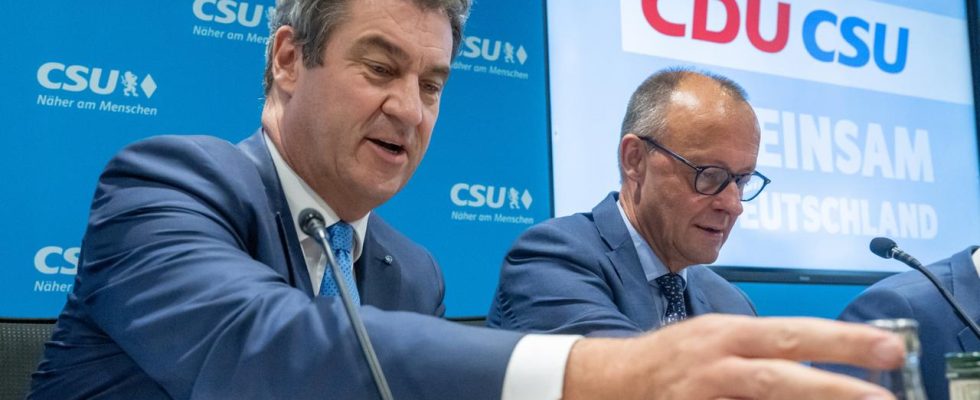analysis
100 days before the elections in Hesse and Bavaria, the CDU and CSU sharpen their conservative profile in a strategy paper – and want to offer more than traffic light bashing. CDU leader Merz followed the K question to Munich.
After the sausage is before the sausage: On Thursday evening, Markus Söder and Friedrich Merz distributed photos of the peaceful bratwurst grilling, on Friday morning they smiled at the camera at the white sausage breakfast.
Even before the joint presidium meeting of the CSU and CDU in Munich, the two party leaders wanted to demonstrate harmony – and as a sign of this unity, Söder and Merz also presented a freshly decided joint ten-point program at noon. When asked, they don’t deny that it basically contains nothing new – but they want the mere existence of the paper to be understood as a success and a signal.
Turning away from the Merkel era
At the press conference in the CSU headquarters, Söder emphasized that in 2017 such a declaration with clear demands on internal security and migration “would not have been quite possible”. “That’s a clear statement.” Merz emphasizes that in the fight against illegal migration, protection of national borders is required: “You wouldn’t have found that six years ago in a joint decision paper by the CDU and CSU.”
In 2017, the CDU leader was still called Angela Merkel, and the sister parties were bitterly arguing about refugee policy at the time. With the new five-page paper, the Union is once again cementing its departure from the Merkel CDU of the years up to 2018 and also from Söder’s “green” CSU course of the year 2019. The new “Agenda for Germany” focuses in particular on issues of conservative politics the focus: migration and citizenship, internal security and the fight against crime, demand for relief for the middle classes and the economy.
In this paper, too, the CDU and CSU do not skimp on criticism of the federal government. They accuse the traffic light parties of increasing people’s concerns with “always new requirements and burdens, with bans and paternalism”. The traffic light argues instead of providing stability.
Union also wants to be constructive
But the five sides want more: it is an attempt to refute the criticism that the Union is almost exclusively engaged in traffic light bashing. A criticism that also comes from within its own ranks – most recently from Schleswig-Holstein’s Prime Minister Daniel Günther in a newspaper interview.
“Of course, we have to criticize,” says Merz. But: “We don’t exhaust ourselves in criticism.” On the contrary, the Union is also making very constructive proposals. And Söder emphasizes that the entire program is almost an answer to people’s uncertainty. The ten-point plan promises “clear proposed solutions” for a “realpolitik close to the people.” “Immigration of skilled workers instead of uncontrolled migration” is one of the points, “Climate protection instead of climate glue” is another, “zero tolerance towards criminals” is a third.
A mini federal election in autumn
100 days before the state elections in Hesse and Bavaria, this should also give the campaigning Prime Ministers Boris Rhein (CDU) and Markus Söder (CSU) a tailwind. For example, the paper includes Rhein’s call for electronic ankle bracelets for men who have hit women. The “no to inheritance tax on the parental home” can be interpreted as an effort not to leave the issue to the free voters alone in the Bavarian state election campaign.
The votes in Hesse and Bavaria stylize Merz, Söder and Rhein into a kind of mini federal election – after all, almost a quarter of Germans live in both countries together. October 8th is “centrally important” for Hesse and Bavaria, but also a “giant signal” for Germany, says Söder. “It’s actually halfway through the traffic lights.”
According to Merz, the elections will provide information about “with what support from the population” the Union starts in the second half of the legislative period in the federal government. He himself will be heavily involved in both election campaigns. And Rhein calls the votes “real midterms” based on midterm elections in the USA – with meaning for Germany as a whole: “Because citizens can of course say very clearly that they are fed up with what is happening in Berlin.”
Söder speaks of “timing and tuning”
As much as the leaders of the CDU and CSU emphasize the importance of the two state elections, they don’t want to talk about the 2025 federal election this afternoon – more precisely: about the Union’s candidacy for chancellor. Söder emphasizes that it makes sense not to discuss questions about the 2025 federal election as early as 2023. “Timing and tuning are always very important,” he says.
And Merz confirms: “We will decide together in late summer 2024 – that is the procedure.” The CDU boss downplays the recent praise from Prime Minister Günther from the far north for the possible Merz rival Hendrik Wüst from North Rhine-Westphalia: He is happy about “every prime minister from the ranks of the Union who praises another prime minister”, emphasizes he. He is happy about this harmony in the Union. Merz is unlikely to get rid of the debate about the K question any time soon.

